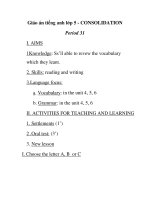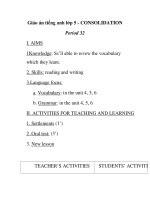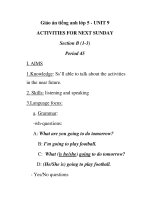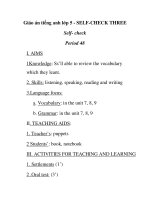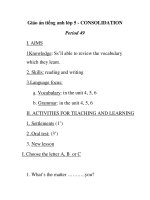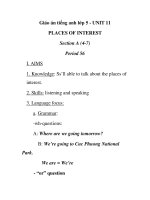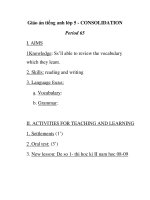Giáo án tiếng anh lớp 5 (chuyên sâu)
Bạn đang xem bản rút gọn của tài liệu. Xem và tải ngay bản đầy đủ của tài liệu tại đây (7.15 MB, 228 trang )
CHUYÊN SÂU TI ẾNG ANH LỚP
5
---------------------------------------------------------------------------------------------------------------------------
Unit 1
WHAT’S YOUR ADDRESS?
I. VOCABULARY.
Tiếng Anh
Phiên âm
Tiếng Việt
address (n)
/ə'dres/
địa chỉ
lane (n)
/lein/
ngõ
road (n)
/roud/
đường (trong làng)
street (n)
/stri:t/
đường (trong thành phố)
flat (n)
/flỉt/
căn hộ
village (n)
/'vilidʒ/
ngơi làng
country (n)
/'kʌntri/
đất nước
tower (n)
/'taʊə/
tịa tháp
mountain (n)
/ˈmaʊntən/
ngọn núi
district (n)
/'district/
huyện, quận
province (n)
/'prɔvins/
tỉnh
hometown (n)
/'həumtaun/
quê hương
where (adv)
/weə/
ở đâu
from (prep.)
/frəm/
đến từ
pupil (n)
/'pju:pl/
học sinh
live (v)
/liv/
sống
busy (adj)
/bizi/
bận rộn
far (adj)
/fɑ:/
xa xôi
Page 1
CHUYÊN SÂU TI ẾNG ANH LỚP
5
---------------------------------------------------------------------------------------------------------------------------
quiet (adj)
/'kwaiət/
yên tĩnh
crowded (adj)
/''kraudid/
đông đúc
large (adj)
/lɑ:dʒ/
rộng
small (adj)
/smɔ:l/
nhỏ, hẹp
pretty (adj)
/'priti/
xinh xắn
beautiful (adj)
/'bju:tiful/
đẹp
II. GRAMMAR.
1. Cách dùng giới từ “on”, “in” và “at”
a) Giới từ "on" có nghĩa là "trên; ở trên"
- on được dùng để chỉ vị trí trên bề mặt.on + the + danh từ chỉ vị trí trên bề mặt
Ex : On the table . Trên cái bàn.On the bed. Trên giường.
- on được dùng để chỉ nơi chốn hoặc số tầng (nhà).
on + the + danh từ chỉ nới chốn hoộc số tầng
Ex : on the platform/ island/ river/ beach : ở sân ga/ đảo/ sông/ bãi biển
- on the (1st, 2nd, 3rd) floor : ở tầng 1, 2, 3
b) Giới từ "in" có nghĩa là "trong; ở trong"
- in được dùng để chỉ vị trí bên trong một diện tích, hoặc trong khơng gian (khi có vạt
gì đó được bao quanh).
Ex:
in the world/ in the sky/ in the air : trên thế giới, trong bầu trời, trong khơng khí.
in a book/ in a newspaper: trong quyển sách/ trong tờ báo
c) at (ở tại): dùng cho địa chỉ nhà
Ex: I live at 20 Quang Trung Street.
Tôi sống ở số 20 đường Quang Trung.
2. Viết địa chỉ nhà
số nhà, tên đường + street, Ward + tên phường, District + tên quân, tên thành phố
+ City
Page 2
CHUYÊN SÂU TI ẾNG ANH LỚP
5
---------------------------------------------------------------------------------------------------------------------------
Ex: 128/27, Thien Phuoc street, Ward 9, Tan Binh District, Ho Chi Minh Cit: 128/27
đường Thiên Phước, phường 9, quận Tân Bình, Thành phố Hồ Chí Minh.
LƯU Ý:
Tan Dinh Ward: phường Tân Định
Ward 3: phường 3
Ben Nghe Quarter: phường Bến Nghé
Tan Phu District: quận Tởn Phú
District 1: quận 1
Cu Chi District: huyện Củ Chi
Quang Binh Province: tỉnh Quảng Bình
Nha Trang City: Thành phố Nha Trang
3. Hỏi và trả lời về địa chỉ của một ai đó
Khi muốn hỏi và trả lời về địa chỉ của ai đó, chúng ra sẽ sử dụng các mẫu câu sau:
What's Your Address?Địa chỉ của bạn là gì?
It’s + địa chỉ nhà. đó là...
Ex: What's your address? Địa chỉ của bạn là gì?
It's 654, Lac Long Quan Street, Tan Binh District.Nó là số 54 đường Lạc Long Qn,
quận Tân Bình.
4. Hỏi và trả lời về ai đó sống ở đâu
Where does he/she live?Cậu ấy/ cô ấy sống ở đâu?
- Ở cấu trúc (1) sử dụng động từ thường "live" (sống) trong câu nên chúng ta phải dùng
trợ động từ "does" vì chủ ngữ chính trong câu là ngơi thứ 3 số ít (he/she/it/ hoặc danh từ
số chỉ số ít).
He/she lives at + địa chỉ nhà.Cậu ây/ cô ấy sống ở ...
He/she lives on + nơi chốn hoặc chỉ số tầng nhà. Cậu ấy/ cô ấy sống ở…..
Ex :
- Where does he live?Cậu ấy sống ở đâu?
- He lives at 12 Lac Long Quan street.Cậu ấy sống ở số 12 đường Lọc Long Quân.
- He lives on the first floor of An Lac Tower. Cậu ấy sống ở tầng 1 của Tòa tháp An
Lạc.
Where do you/they live? Bạn/ Họ sống ở đâu?
- Cấu trúc (2) sử dụng động từ thường "live (sống)" trong câu nên chủng ta phải dùng
trợ động từ "do" vì chủ ngữ chính trong câu là 'you/ they" ở dạng số nhiều.
Để trả lời cho cấu trúc trên chúng ta có thể sử dụng các mẫu câu sau:
I/they live at + địa chỉ nhà.Tôi/ họ sống ở ...
I/they live on + nơi chốn hoặc chỉ số tầng nhà.Tôi/ họ sống ở...
Page 3 PRACTICE
CHUYÊN SÂU TI ẾNG ANH LỚP
5
---------------------------------------------------------------------------------------------------------------------------
Task 1. Read and odd one out.
1. a. new
b. village road
c. floor
d. address
2. a. lane
b. street
c. city tower
d. pupil
3. a. district
b. quiet
c. hometown
d. island
4. a. small
b. beautiful
c. like
d. busy
5. a. island
b. town
c. city
d. crowded
Task 2. Look and write the correct words. There is one example.
Example: It’s an area surrounded by water.
1. It’s a tall building with many floors.
2. It’s a long and narrow road.
3. It is a small town in the countryside.
4. It tells you where a person lives.
island
_________
_________
_________
_________
Task 3. Choose the correct answer
1. Hanoi is a big _____ in the north
A. street
B. town
C. city
D. lane
2. She lives in a crowded _____in Ho Chi Minh city
A. street
B. city
C. village
3. His flat is far _____ the city centre
Page 4
D. lane
CHUYÊN SÂU TI ẾNG ANH LỚP
5
---------------------------------------------------------------------------------------------------------------------------
A. from
B. to
C. with
D. of
4. There are two tall _____ in my street
A. tower
B. towers
C. town
D. towns
5. What subject is he _____ now? -Vietnamese
A. to learn
B. learn
C. learning
D. learned
6. ______ did she go yesterday morning? - She went to the supermarket
A. What
B. Where
C. When
D. Why
7. Are you free ____ the evening? - Yes, I am
A. in
B. on
Task 4. Read and tick
C. at
D. to
True or False. There is one example (0).
Phong lives with his grandparents in Ha Noi. His address is 35, Hang Bai Street, Hoan
Kiem District. The family lives on the sixth floor of Xuan Mai Tower. Their flat is big
with five rooms. Phong likes his place because it is in the city centre and near his
school.
True False
✔
0. Phong lives with his grandparents in a small town.
1. Blue Sky Tower is at 35, Hang Bai Street, Hoan Kiem District.
2. Phong’s flat is big with five rooms on the 6th floor.
3. Phong doesn’t like living in the city centre.
4. Phong’s school is near Xuan Mai tower.
Task 5. Read and number the sentences in the correct order. The conversation
begins with 0.
A Tony: I lived in a small and pretty town near London.
Page 5
CHUYÊN SÂU TI ẾNG ANH LỚP
5
---------------------------------------------------------------------------------------------------------------------------
B Ms Ha: And where do you live now in Ha Noi?
0
C
Tony: Good morning, Ms Ha. I’m in Hoan Kiem district. I’m your new
pupil.
D Ms Ha: Hi, Tony. Nice to meet you. Where did you live in England?
E Tony: I live in a beautiful and quiet house near West Lake.
Task 6. Look and write
.There is one example.
Example:
He lives on a far and quiet island.
1. His address is 10 South ____________.
2. He lived in a house in the ______________.
3.
She lives on the second floor of Ha Noi
________________.
4. Her __________ is pretty and big.
Task 7. Order the words. There is one example.
Example:
lives / city / a / he / crowded / in
He lives in a crowded city.
1.
you / do / live / where/?
Page 6
CHUYÊN SÂU TI ẾNG ANH LỚP
5
---------------------------------------------------------------------------------------------------------------------------
____________________________________________________________________?
2
.
your / is / what / address/?
____________________________________________________________________?
3
is / your / new / like / place / what/?
. ____________________________________________________________________?
4
hometown / what / is / your / like/?
. ____________________________________________________________________?
5.
56 Nguyen Trai/ is / Street/ It/.
____________________________________________________________________.
6.
she/ Where/ does/ live/?
____________________________________________________________________?
7.
Danang/ hometown/ His/ city/ is/.
____________________________________________________________________.
8.
small/ quiet/ village/ and/ It/ is/ a./
____________________________________________________________________.
9.
you/ Do/ your/ live/ with/ parents/ ?
____________________________________________________________________?
Page 7
are/ modern/ There/ towers/ my/ in/ city/.
CHUYÊN SÂU TI ẾNG ANH LỚP
5
---------------------------------------------------------------------------------------------------------------------------
10.
____________________________________________________________________.
Task 8.
Look and complete the paragraph.
He comes from Canada. He lived in a (0)
house in the (1)
____________________ in Quebec. Now, he lives with his grandparents
in Ha Noi. His (2)
____________________is 18 Hang Bai Street, Hoan
Kiem District. The family lives on the sixth floor of Blue Sky (3)
____________. Their flat is
big with five rooms. Jack likes his place because it’s in the city (4)
Page 8
CHUYÊN SÂU TI ẾNG ANH LỚP
5
---------------------------------------------------------------------------------------------------------------------------
_________________ and near his (5)
_________________ .
Task 9. Find the mistake in each sentence.
1. I don’t likes living in the city because it’s too noisy.
A
B
C
D
2. There are lots of car and motorbikes in my city.
A
B
C
D
3. Whats the mountain like? - It’s high and beautiful .
A
B
C
D
Task 10. Read the questions. Write about your friend. There is one example.
0. What’s his/her name?
My friend is
______________________________________________________________________
Page 9
CHUYÊN SÂU TI ẾNG ANH LỚP
5
---------------------------------------------------------------------------------------------------------------------------
___.
1. What’s his/her address?
He/She lives
______________________________________________________________________
___.
2. What’s his/her home like?
His/Her home
______________________________________________________________________
_.
3. Who does he/she live with?
He/She
______________________________________________________________________
__________.
4. Does he/she like his/her hometown? Why/Why not?
He/She ______________________________ because ______________________.
UNIT 2
I ALWAYS GET UP EARLY . HOW ABOUT YOU ?
I. VOCABULARY.
Tiếng Anh
Phiên âm
Tiếng Việt
get up
/getʌp/
thức dậy
wash the face
/wɔ∫ ðə feis/
rửa mặt
brush the teeth
bu∫ ðə ti:θ/
đánh răng
have breakfast
/hæv 'brekfəst/
ăn sáng
do morning exercises
/du: 'mɔ:niη 'eksəsaiz/
tập thể dục buổi sáng
go to school
/gou tu: sku:l/
đi học
Page 10
CHUYÊN SÂU TI ẾNG ANH LỚP
5
---------------------------------------------------------------------------------------------------------------------------
study
/stʌdi/
học
ride a bike
/raid ə baik/
đi xe đạp
have lunch
/hæv lʌnt∫/
ăn trưa
have dinner
/hæv 'dinə/
ăn tối
watch televionsion
/wɔt∫ ´televiʒn/
xem tivi
cook
/kuk/
nấu ăn
homework
/'houmwə:k/
bài tập về nhà
online
//ɔnlain
trực tuyến
early
/ə:li/
sớm
always
/'ɔ:lweiz/
luôn luôn
often
/'ɔfn/
thường
usually
/'ju:ʒəli/
thường xuyên
sometimes
/'sʌmtaimz/
thi thoảng
seldom
/'seldəm/
hiếm khi
never
/'nevə/
không bao giờ
talk
/tɔ:k/
nói chuyện
after
/'ɑ:ftə/
sau khi, sau
before
/bi'fɔ:/
trước khi, trước
surf the internet
/sə:f ði 'intə:net/
truy cập internet
look for
/luk fɔ:(r)/
tìm kiếm
information
/infə'mei∫n/
thơng tin
project
/'prədʒekt/
dự án
library
/'laibrəri/
thư viện
week
/wi:k/
tuần
Page 11
CHUYÊN SÂU TI ẾNG ANH LỚP
5
---------------------------------------------------------------------------------------------------------------------------
month
/mʌnθ/
tháng
II. GRAMMAR
1. Cách sử dụng các trạng từ chỉ mức độ thường xuyên(Adverbs of Frequency)
Thường thì những trạng từ này bổ nghĩa cho động từ, cho chúng ta biết hành động đó
diễn ra với mức độ thường xuyên thế nào. Có rất nhiều trạng từ chỉ sự thường xuyên,
sau đây một số trạng từ thông dụng thường gặp:
• always ln ln
Ex: He is always late.: Anh ấy ln ln đến trễ.
• usually thường (tận suốt 6 ngày/ 7 ngày)
Ex: We usually go to the zoo on Sundays: Chúng tôi thường đi sở thú vào các ngày Chủ
nhật.
• often thường (tận suốt 4 hoặc 5 ngày/ 7 ngày)
Ex: What does she often do in the morning?Cô ấy thường làm gì vào buổi sáng?
• sometimes thỉnh thoảng (khoảng 3 ngày/ 7 ngày)
Ex: I sometimes play game in the evening.
Tạm dịch: Thỉnh thoảng tôi chơi game vào buổi tối
• seldom/ rarely hiếm khi (chỉ 1 hoặc 2 ngày... cả năm, khá hiếm)
Ex: He rarely stays at home in the afternoon.
Tạm dịch: Anh ấy hiếm khi ở nhà vào buổi chiều.
• hardly hầu như khơng (coi như là khơng luôn)
Ex: He hardly forgets that.
Tạm dịch: Anh ta hầu như khơng qn chuyện đó.
• never khơng bao giờ (hồn tồn khơng có)
Lưu ý:Hãy nhớ vị trí của những trạng từ này đứng trước động từ thường và sau động từ
"to be".
Ex: I usually get up at six o'clock: Tôi thường thức dậy lúc 6 giờ.
- He sometimes drinks beer: Thỉnh thoảng anh ấy uống bia.
- Sau động từ “to be” phải là danh từ, tính từ hoặc từ/ cụm từ chỉ nơi chốn.
Ex: He is usually a good pupil.Anh ấy thường là học sinh ngoan.
- He is seldom sick: Anh ta hiếm khi nào bị bệnh.
- Trong câu có động từ “to be” thì khơng có động từ thường ngược lại có động từ
thường thì khơng có “to be”.
Ex: I am a student. I live in Ho Chi Minh City.
Page 12
CHUYÊN SÂU TI ẾNG ANH LỚP
5
---------------------------------------------------------------------------------------------------------------------------
Tôi là sinh viên. Tôi số ở Thành phố Hồ Chí Minh.
2. Hỏi và trả lời về thói quen thường ngày của ai đó Khi muốn hỏi về thói quen
thường ngày của một ai đó, các bạn có thể sử dụng những mẫu câu sau:
(1) What do you/they do in the morning/aftemoon/evening?
Bạn/Họ làm gì vào buổi sáng/buổi trưa/buổi tối?
(2) What does he/she do in the morning/afternoon/evening?
Cậu ấy/Cơ ấy làm gì vào buổi sáng/buổi trưa/buổi tối?
Để trả lời cho những mẫu câu trên, các bạn có thể sử dụng mẫu trả lời sau:
(1) I/They always/usually/often/sometimes...
Bạn/Họ luôn luôn/thường / thường thường/ thỉnh thoảng
(2) He/She always/usually/otten/sometimes...Cậu ấy/Cô ấy... luôn luôn/thường / thường
thường/ thỉnh thoảng
Ex:
(1) What do you do in the morning? I always brush my teeth: Bạn làm gì vào buổi
sáng? Tơi ln ln đánh răng.
(2) What does he do in the evening?He sometimes watches TV.
Cậu ấy làm gì vào buổi tối?Cậu ấy thỉnh thoảng xem ti vi.
Ngồi ra, các bạn có thể sử dụng các phó từ chỉ sự thường xuyên như: always (luôn
luôn), often (thường), usually (thường xuyên), sometimes thỉnh thoảng),... trong câu hỏi
để hỏi ai đó thường làm gì... vào lúc nào. Đi sau giới từ “on” là các ngày trong tuần; đi
sau giới từ “in” là tháng/năm và các buổi trong một ngày.
Cấu trúc hỏi:
(1) What do you/they often do on Sunday?
Bạn/Họ thường làm gì vào Chủ nhật?
(2) What does he/she sometimes do in the evening?
Cậu ấy/Cơ ấy thỉnh thoảng làm gì vào tối?
Câu trúc:
(1) I/They often...Bọn/Họ thường...
(2) He/She sometimes...Cậu ấy/Cô ấy thỉnh thoảng...
Ex: What do you sometimes do on Sunday?Bạn thỉnh thoảng làm gì vào Chủ nhật?
- I sometimes play football on Sunday.Tơi thỉnh thoảng chơi bóng đá vào Chủ nhật..
What does she often do in the morning?Cơ ấy thường làm gì vào buổi sáng?
She often gets up in the early morning.Cô ấy thường thức dậy sớm vào buổi sáng.
3. Khi muốn hỏi tần suất xảy ra của một hành động, có thể dùng cấu trúc sau:
Page 13
CHUYÊN SÂU TI ẾNG ANH LỚP
5
---------------------------------------------------------------------------------------------------------------------------
How often + do(does + chủ ngữ + một hành động nào đó? .... mấy lần?
Ex: How often do you play table tennis?Bạn thường chơi bóng bàn mấy lần?
Twice a week. (Hai lần 1 tuần)How often does she watch TV?
Cô ấy thường xem ti vi mấy lần?Three times a week. (Ba lần 1 tuần.)
Chú ý:
Thông thường chúng ta rất dễ nhầm lân cách viết khi muốn diễn đạt mấy lần trong tuần,
bên dưới đây là một số điều cân lưu ý khi đề cập:
- once a week (1 lần 1 tuần)
- twice a week (2 lần 1 tuần)
- three times a week (3 lần 1 tuần)
- four times a week (4 lần 1 tuần)
- five times a week (5 lần 1 tuần)
PRACTICE
Task 1. Find the word which has a different sound in the partunderlined.
1. A. early
B. my
C. usually
D. city
2. A. always
B. play
C. have
D. face
3. A. like
B. evening
C. dinner
D. film
4. A. study
B. surf
C. up
D. bus
5. A. kind
B. ride
C. twice
D. fishing
Task 2. Choose the best answer.
1. They usually ……… early and do morning exercise.
A.
gets on
B. get up
C. get on
D. gets up
2. What ……… you do after school? – I usually do my homework.
A.
do
B. are
C. does
D. x
3. Mary often ……… TV after dinner with her parents.
A.
watch
B. to watch
C. watches
D. watchs
4. What does your mother …….. in the evening? – She ……… me with my homework.
A.
do – help
B. do – helps
C. does – helps
D. does – help
5. I sometimes go to the sports centre with my friends ……… the afternoon.
Page 14
CHUYÊN SÂU TI ẾNG ANH LỚP
5
---------------------------------------------------------------------------------------------------------------------------
A.
on
B. at
C. with
Task 3. Look and write the correct words.
Example: It’s the first thing we
do after sleeping.
D. in
There is one example.
get up
1. It’s the first part of the day.
……………………
……….
2. You do something very often.
……………………
……….
3. Your teacher gives it to you,
and asks you to do it at home.
……………………
……….
4. You and a classmate work to
gether for a task.
……………………
……….
Task 4. Read and tick
True or False. There is one example (0).
Daisy lives with her family in the centre of Ha Noi. She gets up at 5.30 in the morning.
She often goes jogging with her father. After breakfast, she takes a bus to school. After
school, she plays basketball with her friends three times a week. In the evening, she
does her homework. Then she watches TV or reads books. She always goes to bed
early.
True False
✔
0. Daisy lives with her family in the countryside.
1. She always gets up early.
2. She rides a bike to school.
Page 15
CHUYÊN SÂU TI ẾNG ANH LỚP
5
---------------------------------------------------------------------------------------------------------------------------
3. She plays basketball three times a week.
4. She often watches TV or reads book before she does her
homework.
Task 5. Read and number the sentences in the correct order. The conversation
begins with 0.
A Mr Tuan: Oh, really? Do you live far from the school?
B Nam: I go by bus.
0
C Nam: Good morning, Mr Tuan. How are you?
D
Mr Tuan: Hi, Nam. I'm fine. Thank you. How do you go to school every
day?
E Nam: Yes. It's about thirty minutes by bus.
Task 6. Complete the dialogue.
twice
after
cooking
often
late
are
Adam: What (1)……… you doing, Susan?
Susan: I’m (1) …………… dinner.
Adam: Do you like cooking?
Susan: Yes, I do. I usually cook (2) ………….. school because my mother always
comes home (3) ………... I help my mother with shopping too.
Adam: How (4) ……………. do you go shopping?
Susan: (5) ……………. a week.
Task 7. Look and fill each gap with one word . There is one example (0).
Hi, my name’s Joe. Every morning I(0)
get up early. I do morning (1)
_____________, have breakfast and then go to school. Twice a week, I go
to the sports centre and play (2)
_____________ with my friends after
Page 16
CHUYÊN SÂU TI ẾNG ANH LỚP
5
---------------------------------------------------------------------------------------------------------------------------
school. In the evening, I often do my (3)
_____________ after dinner. Then I
watch TV and go to (4)
_____________ at around (5)
____________p.m.
Task 8. Look at the pictures. Read and write one word for each gap. There is one
example.
Example:
My brother usually plays computer games at the weekend.
1. Her sister___________ gets up early in the morning.
2. Nancy often ___________ a bike to school.
3. We go to the library ___________ a week.
4. I often __________ with my partners in the class.
Task 9. Order the words. There is one example.
Example: gets / early / in / the / morning / he / up
He gets up early in the morning.
1.
you / morning / do / exercise / do / often / how
________________________________________________________________?
Page 17
CHUYÊN SÂU TI ẾNG ANH LỚP
5
---------------------------------------------------------------------------------------------------------------------------
2.
you / in / what / evening / do / the / do
________________________________________________________________?
3.
a / goes / my / once / father / fishing / week
________________________________________________________________.
4.
/ never / I / night / internet / at / surf
________________________________________________________________.
Task 10. Read the questions. Write about your best friend. There is one example
(0).
0. What’s his/her name?
My best friend is __________________________.
1. What does he/she usually do before school in the morning?
He/She usually ___________________________.
2. What does he/she usually do after school?
He/She often ____________________________.
3. What does he/she usually do with you?
He/She _________________________________.
4. What do you think of him/her?
I think/like _______________________________.
UNIT 3
WHERE DID YOU GO ON HOLIDAY ?
I. VOCABULARY.
Tiếng Anh
Phiên âm
Page 18
Tiếng Việt
CHUYÊN SÂU TI ẾNG ANH LỚP
5
---------------------------------------------------------------------------------------------------------------------------
holiday
/'hɔlədi/
kỳ nghỉ
weekend
/'wi:kend/
ngày cuối tuần
trip
/trip/
chuyến đi
Island
/'ailənd/
Hòn đảo
imperial city
/im'piəriəl siti/
kinh thành
ancient
/'ein∫ənt/
cổ, xưa
town
/taun/
thị trấn, phố
bay
/bei/
vịnh
seaside
/si:'said/
Bờ biển
really
/'riəli/
thật sự
great
/greit]/
tuyệt vời
airport
/'eəpɔ:t/
sân bay
(train) station
/trein 'strei∫n/
nhà ga (tàu)
swimming pool
/'swimiη pu:l/
Bể bơi
railway
/'reilwei/
đường sắt (dành cho tàu hỏa)
by
/bai/
bằng (phương tiện gì đó)
train
/trein/
tàu hỏa
car
/ka:(r)/
ơ tơ
taxi
/''tỉksi/
xe taxi
plane
/plein/
máy bay
underground
/'ʌndəgraund/
tàu điện ngầm
motorbike
/'moutəbaik/
xe máy
boat
/bout/
tàu thuyền
hometown
/'həumtaun/
quê hương
Page 19
CHUN SÂU TI ẾNG ANH LỚP
5
---------------------------------------------------------------------------------------------------------------------------
province
/'prɔvins/
tỉnh
classmate
/'klɑ:smeit/
bạn cùng lớp
family
/'fỉmili/
gia đình
picnic
/'piknik/
chuyến đi dã ngoại
II. GRAMMAR
1. Hỏi và đáp về ai đó đã làm gì, đi đâu vào kỳ nghỉ
Để hỏi về ai đó đã làm gì vào kỳ nghỉ của họ, các bạn có thể sử dụng mẫu câu sau:
a. What did you do on holiday? Bạn đã làm gì vào kỳ nghỉ?
b. Where did you go on holiday? Bạn đã đi đâu vào kỳ nghỉ?
Ở hai cấu trúc trên, chủ ngữ “you”, các bạn có thể thay đổi chủ ngữ nào cũng được
sao cho hợp lý. Có thể "you” thay bằng "she/he/they/we/..."
Để trả lời cho các câu hỏi trên, các bạn có thể sử dụng cấu trúc sau: Chủ ngữ (S) + động
từ ở quá khứ + ...
Ex: What did you do on holiday?
Bạn làm gì vào kỳ nghỉ?
I went on a trip with my family.
Tôi đã đi du ngoạn cùng với gia đình.
Where did he go on holiday?
Cậu ấy đã đi đâu vào kỳ nghỉ?
He went to Nha Trang beach.
Cậu ấy đi bãi biển Nha Trang.
2. Hỏi và đáp về ai đó đã đi bằng phương tiện gì?
Khi muốn hỏi về ai đó đã đi bằng phương tiện gì, chúng ta có thể sử dụng các cấu trúc
sau:
How + did + chủ ngữ (S) + động từ (V-bare inf) + ... ?
Hay How did you get there?
Bạn đến đó bằng gì/cách nào?
V-bare inf: động từ nguyên mẩu (thể)
Đáp:
By + phương tiện đi lại.
Hoặc I went by + phương tiện đi lại.
Tôi đi bằng...
Page 20
CHUYÊN SÂU TI ẾNG ANH LỚP
5
---------------------------------------------------------------------------------------------------------------------------
Ex: How did you get there?
Bạn đã đến đó bằng gì/cách nào?
By train.
Bằng tàu lửa.
I went by train.
Tôi đi bằng tàu lửa.
Một số phương tiện đi lại mà các em cần nhớ:
By bus (bằng xe buýt)
By coach (bằng xe đò /xe khách)
III. PRACTICE .
Task 1. Read and match . There is one example.
0. It is long and it can go on the ground.
1. It can fly in the sky.
2. It can go in the sea.
3. It is long. It can go under the ground.
4. You must wear a helmet when you ride it.
Task 2. Read ,complete and tick
True or False. There is one example (0).
coachparents Museumvisitedatedifferent
Alex is my penfriend. He lives with his(0) parentsin Da Nang. He likes visiting
Page 21
CHUYÊN SÂU TI ẾNG ANH LỚP
5
---------------------------------------------------------------------------------------------------------------------------
………………………….places and meeting people. Last summer, he
………………………….. Hoi An Ancient Town. It is a small town in central Viet Nam.
Alex went there by ………………………. He visited many places like Hoi An
……………………… of History and Culture, and Japanese Bridge. He
………………………… delicious food and swam in the sea. Alex had a good time
there.
True
False
6. Alex lives in Da Nang.
7. His hobby is travelling and meeting people.
8. He went to Hoi An last summer.
9. He went there by train.
10. He enjoyed the trip.
Task 3. Read and number the sentences in the correct order. The conversation
begins with 0.
A Mai: Yes, I did. I went to the seaside with my brother.
B
Phong: I visited my grandparents in the countryside.
C Phong: How did you get there?
0 D Phong: Did you have a nice holiday, Mai?
E Mai: I went by plane. What about you? Where did you go?
Task 4. Look and fill each gap with one word . Write the word next to the number.
There is one word that you do not need. There is one example (0).
Linda comes from England. She lives with her sister in Ho Chi Minh (0)
City. Last weekend, they had a wonderful trip to Ha Long (1)
______________. This is an amazing place in the north of Viet Nam.
The sisters went to Ha Noi by (2)
______________. Then they went to
Page 22
CHUYÊN SÂU TI ẾNG ANH LỚP
5
---------------------------------------------------------------------------------------------------------------------------
the Quang Ninh by (3)
______________. At the bay, they had a boat
cruise around the islands and took a lot of photos. They (4)
______________ in the sea and had delicious (5)
They had
______________.
a wonderful weekend at the seaside.
Task 5. Odd one out.
1. a. big
b. small
c. old
d. well
2. a. flower
b. lake
c. sea
d. garden
3. a. town
b. city
c. country
d. house
4. a. travel
b. bike
c. bus
d. car
5. a. get
b. leave
c. school
d. start
Task 6.Choose the word whose underlined part is pronounced differently from
that of others in each group.
1/ A. went
B. where
C. never
D. get
2/ A. trip
B. did
C. with
D. nice
3/ A. Bay
B. play
C. stay
D. watch
Task 7.Pick out the word whose main stressed syllable is different from the rest
1/ A. holiday
B. ancient
C. imperial
D. summer
2/ A. photo
B. seaside
C. island
D. about
Task 8. Choose the correct answer.
1/ I went ……... a trip with my family.
A. in
B. on
C. at
D. of
2/ What was the trip …….?
A. is
B. was
C. like
D. were
3/ ……… did you go on holiday?
Page 23
CHUYÊN SÂU TI ẾNG ANH LỚP
5
---------------------------------------------------------------------------------------------------------------------------
A. What
B. Where
C. Which
D. How many
4/ She went to Hoi An Ancient ………
A. city
B. village
C. town
D. island
5/ Where ……… you last summer?
A. are
B. was
C. were
D. is
Task 9. Order the words. There is one example.
Example:
last / wonderful / a / he / trip / summer / had
He had a wonderful trip last summer.
1. you / go / did / where / weekend / last
__________________________________________________________________?
2.
went / to / I / hometown / my
__________________________________________________________________.
3.
you / how / there / get / did
__________________________________________________________________?
4.
train / went / I / there / by
__________________________________________________________________.
Task 10. Read the questions. Write about your last holiday. There is one example
(0).
Page 24
CHUYÊN SÂU TI ẾNG ANH LỚP
5
---------------------------------------------------------------------------------------------------------------------------
0. What’s your name?
My name is _________________________________.
1. Where do you live?
I live _______________________________________.
2. Where did you go to last holiday?
Last holiday, I ________________________________.
3. How did you get there?
I went there by _______________________________.
4. What was the trip like?
It _________________________________________.
UNIT 4
DID YOU GO TO THE PARTY ?
I. VOCABULARY.
Tiếng Anh
Phiên âm
Tiếng Việt
birthday
/'bə:θdei/
ngày sinh nhật
party
/'pɑ:ti/
bữa tiệc
Page 25

